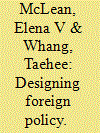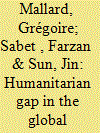|
|
|
Sort Order |
|
|
|
Items / Page
|
|
|
|
|
|
|
| Srl | Item |
| 1 |
ID:
134152


|
|
|
|
|
| Publication |
2014.
|
| Summary/Abstract |
The literature on economic sanctions has long studied sender countries' policymaking as a simple choice between imposing sanctions to extract concessions from the targeted country and doing nothing. We depart from this simplifying assumption and analyze sanctions as a multifaceted foreign policy instrument. We argue that senders design sanction policies in response to policy preferences of two domestic constituencies. Voters expect a response to an international dispute in the form of some policy, such as economic sanctions; hence, the sender's policymakers seek to demonstrate their competence in foreign affairs by imposing sanctions. Once the policymakers announce the use of sanctions, special interest groups that stand to experience economic losses when this foreign policy is implemented pressure the policymakers to choose sanction measures limiting such losses. As a result, the policymakers design sanction policies to include measures that will be less detrimental to special interest groups. We test our theoretical argument using the Threat and Imposition of Sanctions data and show that, while pressures from public opinion increase the likelihood of sanctions, special interest groups that benefit from the relationship with the target country are associated with a lower probability of the use of sanction measures that would impose substantial costs on domestic interest groups.
|
|
|
|
|
|
|
|
|
|
|
|
|
|
|
|
| 2 |
ID:
171081


|
|
|
|
|
| Summary/Abstract |
Since the late 1990s, targeted sanctions and general humanitarian sanctions exemptions have aimed at avoiding the disastrous humanitarian consequences of comprehensive sanctions. In parallel, global banks in charge of administering the international trade of vital goods (food and medicine) have received guidance on how to implement risk-based approaches to avoid completely blockading sanctioned jurisdictions. But these efforts have failed. This article asks: Why has the governance of sanctions and sanctions exemption failed, and what can be done to fix the problem? It argues that a hybrid form of governance in the field of sanctions is responsible for current humanitarian problems. Based on more than eighty interviews with treasury officials, sanctions experts, compliance officers, and others, and taking the international trade of vital goods in Iran as an example, this article assesses various fixes to the governance failures and solutions to address the payment problems that exporters of vital goods in sanctioned jurisdictions face.
|
|
|
|
|
|
|
|
|
|
|
|
|
|
|
|
| 3 |
ID:
142432


|
|
|
| 4 |
ID:
175643


|
|
|
|
|
| Summary/Abstract |
This article analyzes the impact of targeted sanctions (also known as smart sanctions) that Western countries have imposed on Russia due to the Ukrainian conflict by examining the linkages between Russia’s modernization plans for its military equipment, the country’s actual achievements, and the circumstances impeding the execution of Russia’s ambitious ideas. The study focuses on three military innovations currently in development, the T-14 Armata tank together with the Armata universal combat platform, the Su-57 fighter jet, and the new LHD amphibious assault ship. Several other studies have previously described the knowledge-based and technology-based limitations that Russia faces in realizing its ambitions. This article confirms these findings. However, it also broadens the scope of the discussion by focusing on the question whether this Western embargo on the export of military technology, goods, and materials to Russia could lead Russia to a more peaceful or more aggressive road in the future.
|
|
|
|
|
|
|
|
|
|
|
|
|
|
|
|
| 5 |
ID:
097091


|
|
|
| 6 |
ID:
112943


|
|
|
|
|
| Publication |
2012.
|
| Summary/Abstract |
This study focuses on the United Nations' use of sanctions that target particular individuals. This practice is one of the smart sanctions that are standard UN strategy since the mid-1990s. It has given rise to a debate on human rights of those listed. This study is one of the first to analyze the ability of such sanctions to achieve compliance. The theory behind this strategy is identified, based on social and behavioral science insights. More than 400 individuals from eight nonterrorist cases since year 2000 are studied, based on publicly available information. They are studied with respect to their closeness to decisionmaking, demonstrating some flaws in the present application of such sanctions. Suggestions are made for a more focused UN targeting strategy.
|
|
|
|
|
|
|
|
|
|
|
|
|
|
|
|
|
|
|
|
|